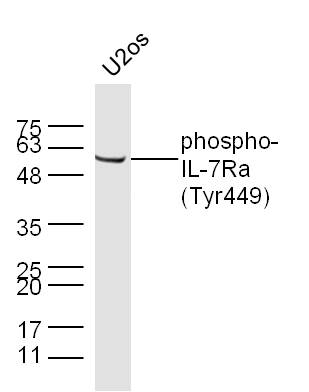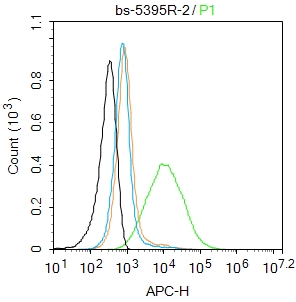
Rabbit Anti-phospho-IL7R (Tyr449)antibody
IL7R alpha (phospho Y449); IL-7Rα; IL-7Ra; Interleukin-7 receptor subunit alpha; CD 127; CD127; CD127 antigen; CDW127; IL 7R alpha; IL 7R; IL-7 receptor subunit alpha; IL-7R subunit alpha; IL-7R-alpha; IL7RA; IL7Ralpha; Interleukin 7 receptor alpha chain;
View History [Clear]
Details
Product Name phospho-IL7R (Tyr449) Chinese Name 磷酸化白细胞介素-7受体a(CD127)抗体 Alias IL7R alpha (phospho Y449); IL-7Rα; IL-7Ra; Interleukin-7 receptor subunit alpha; CD 127; CD127; CD127 antigen; CDW127; IL 7R alpha; IL 7R; IL-7 receptor subunit alpha; IL-7R subunit alpha; IL-7R-alpha; IL7RA; IL7Ralpha; Interleukin 7 receptor alpha chain; Interleukin 7 receptor; Interleukin 7 receptor isoform H5 6; IL7RA_HUMAN. literatures Product Type Phosphorylated anti Research Area immunology Stem cells lymphocyte t-lymphocyte b-lymphocyte Immunogen Species Rabbit Clonality Polyclonal React Species Human, (predicted: Mouse, Rat, Chicken, Dog, Pig, Cow, Horse, ) Applications WB=1:500-2000 ELISA=1:5000-10000 IHC-P=1:100-500 IHC-F=1:100-500 Flow-Cyt=2ug/Test IF=1:100-500 (Paraffin sections need antigen repair)
not yet tested in other applications.
optimal dilutions/concentrations should be determined by the end user.Theoretical molecular weight 48kDa Cellular localization The cell membrane Secretory protein Form Liquid Concentration 1mg/ml immunogen KLH conjugated Synthesised phosphopeptide derived from human IL-7Ra around the phosphorylation site of Tyr449: EA(p-Y)VT Lsotype IgG Purification affinity purified by Protein A Buffer Solution 0.01M TBS(pH7.4) with 1% BSA, 0.03% Proclin300 and 50% Glycerol. Storage Shipped at 4℃. Store at -20 °C for one year. Avoid repeated freeze/thaw cycles. Attention This product as supplied is intended for research use only, not for use in human, therapeutic or diagnostic applications. PubMed PubMed Product Detail The protein encoded by this gene is a receptor for interleukine 7 (IL7). The function of this receptor requires the interleukin 2 receptor, gamma chain (IL2RG), which is a common gamma chain shared by the receptors of various cytokines, including interleukine 2, 4, 7, 9, and 15. This protein has been shown to play a critical role in the V(D)J recombination during lymphocyte development. This protein is also found to control the accessibility of the TCR gamma locus by STAT5 and histone acetylation. Knockout studies in mice suggested that blocking apoptosis is an essential function of this protein during differentiation and activation of T lymphocytes. The functional defects in this protein may be associated with the pathogenesis of the severe combined immunodeficiency (SCID).
Function:
Receptor for interleukin-7. Also acts as a receptor for thymic stromal lymphopoietin (TSLP).
Subunit:
The IL7 receptor is an heterodimer of IL7R and IL2RG. The TSLP receptor is an heterodimer of CRLF2 and IL7R.
Subcellular Location:
Isoform 1: Cell membrane; Single-pass type I membrane protein. Isoform 3: Cell membrane; Single-pass type I membrane protein. Isoform 4: Secreted.
Post-translational modifications:
N-glycosylated IL-7Ralpha binds IL7 300-fold more tightly than the unglycosylated form.
DISEASE:
Defects in IL7R are a cause of severe combined immunodeficiency autosomal recessive T-cell-negative/B-cell-positive/NK-cell-positive (T(-)B(+)NK(+) SCID) . A form of severe combined immunodeficiency (SCID), a genetically and clinically heterogeneous group of rare congenital disorders characterized by impairment of both humoral and cell-mediated immunity, leukopenia, and low or absent antibody levels. Patients present in infancy recurrent, persistent infections by opportunistic organisms. The common characteristic of all types of SCID is absence of T-cell-mediated cellular immunity due to a defect in T-cell development.
Similarity:
Belongs to the type I cytokine receptor family. Type 4 subfamily.
Contains 1 fibronectin type-III domain.
SWISS:
P16871
Gene ID:
3575
Database links:Entrez Gene: 3575 Human
Entrez Gene: 16197 Mouse
Omim: 146661 Human
SwissProt: P16871 Human
SwissProt: P16872 Mouse
Unigene: 591742 Human
Unigene: 635723 Human
Unigene: 389 Mouse
Product Picture
Primary: Anti-phospho-IL-7Ra (Tyr449) (SL5395R) at 1/300 dilution
Secondary: IRDye800CW Goat Anti-Rabbit IgG at 1/20000 dilution
Predicted band size: 48 kD
Observed band size: 55 kD
Blank control: Hela.
Primary Antibody (green line): Rabbit Anti-CD127 antibody (SL5395R)
Dilution: 2μg /10^6 cells;
Isotype Control Antibody (orange line): Rabbit IgG .
Secondary Antibody : Goat anti-rabbit IgG-AF647
Dilution: 1μg /test.
Protocol
The cells were incubated in 5%BSA to block non-specific protein-protein interactions for 30 min at at room temperature .Cells stained with Primary Antibody for 30 min at room temperature. The secondary antibody used for 40 min at room temperature. Acquisition of 20,000 events was performed.
Bought notes(bought amounts latest0)
No one bought this product
User Comment(Total0User Comment Num)
- No comment




 +86 571 56623320
+86 571 56623320
 +86 18668110335
+86 18668110335

